Managing Global Culture: McDonald's Business Model Analysis in India
VerifiedAdded on 2021/05/27
|8
|1547
|50
Report
AI Summary
This report examines McDonald's business model in India, specifically analyzing its joint venture strategy and the cultural challenges encountered. The analysis focuses on the partnership with Vikram Bakshi and the reasons behind its failure, including ineffective supplier relationship management and cultural gaps between Indian and American business practices. The report highlights the significance of Hofstede's cultural dimensions, such as power distance, long-term orientation, uncertainty avoidance, and individualism, in understanding the differences between the United States and India. It argues that McDonald's choice of a joint venture, rather than a wholly-owned subsidiary, may have contributed to the issues. The report also discusses the impact of these cultural differences on brand management and suggests that a foreign direct investment model might have been more effective. The analysis provides insights into the complexities of managing a global brand and adapting to local cultural contexts. This report uses the Hofstede Insights country comparison to highlight the cultural differences between the two countries.
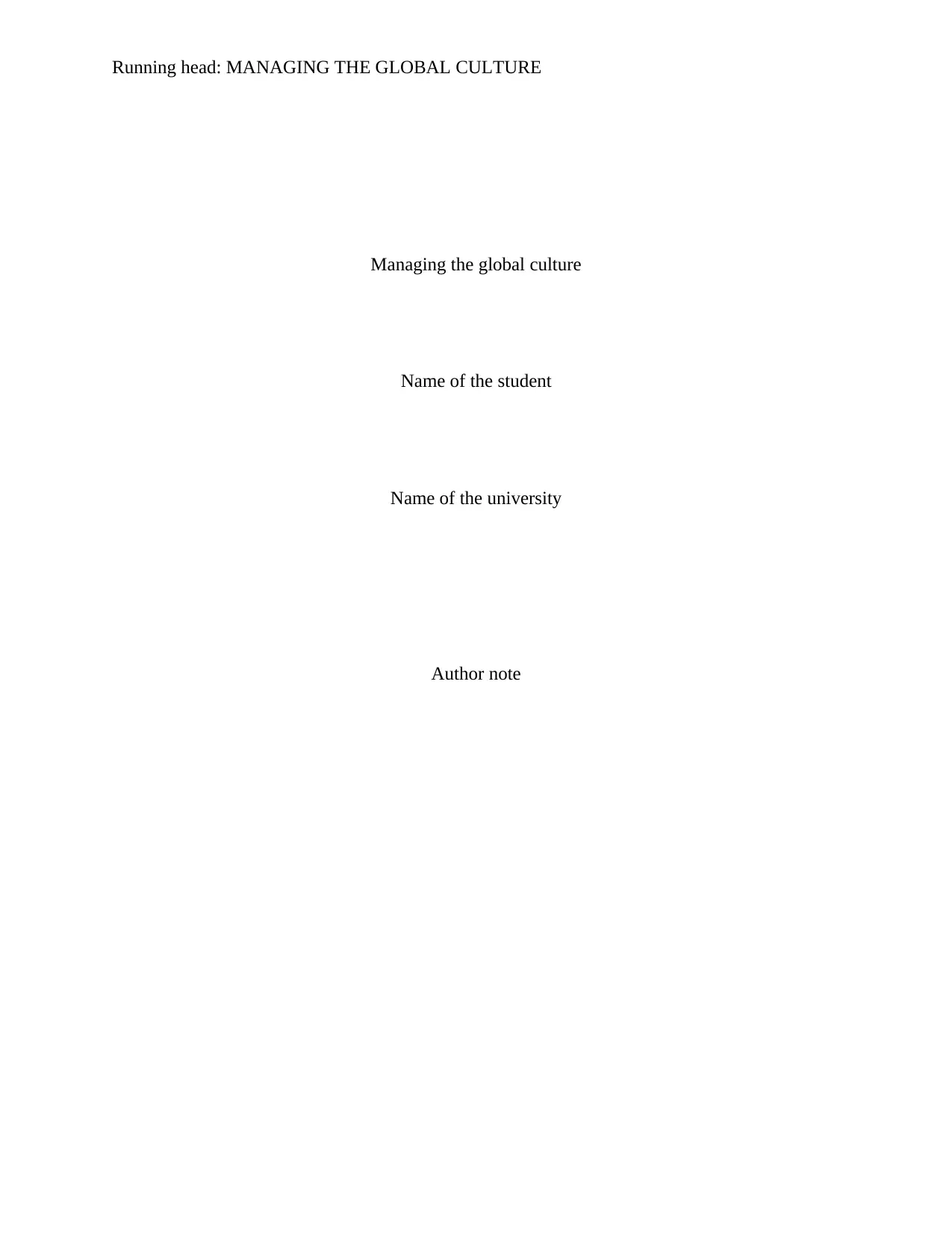
Running head: MANAGING THE GLOBAL CULTURE
Managing the global culture
Name of the student
Name of the university
Author note
Managing the global culture
Name of the student
Name of the university
Author note
Paraphrase This Document
Need a fresh take? Get an instant paraphrase of this document with our AI Paraphraser
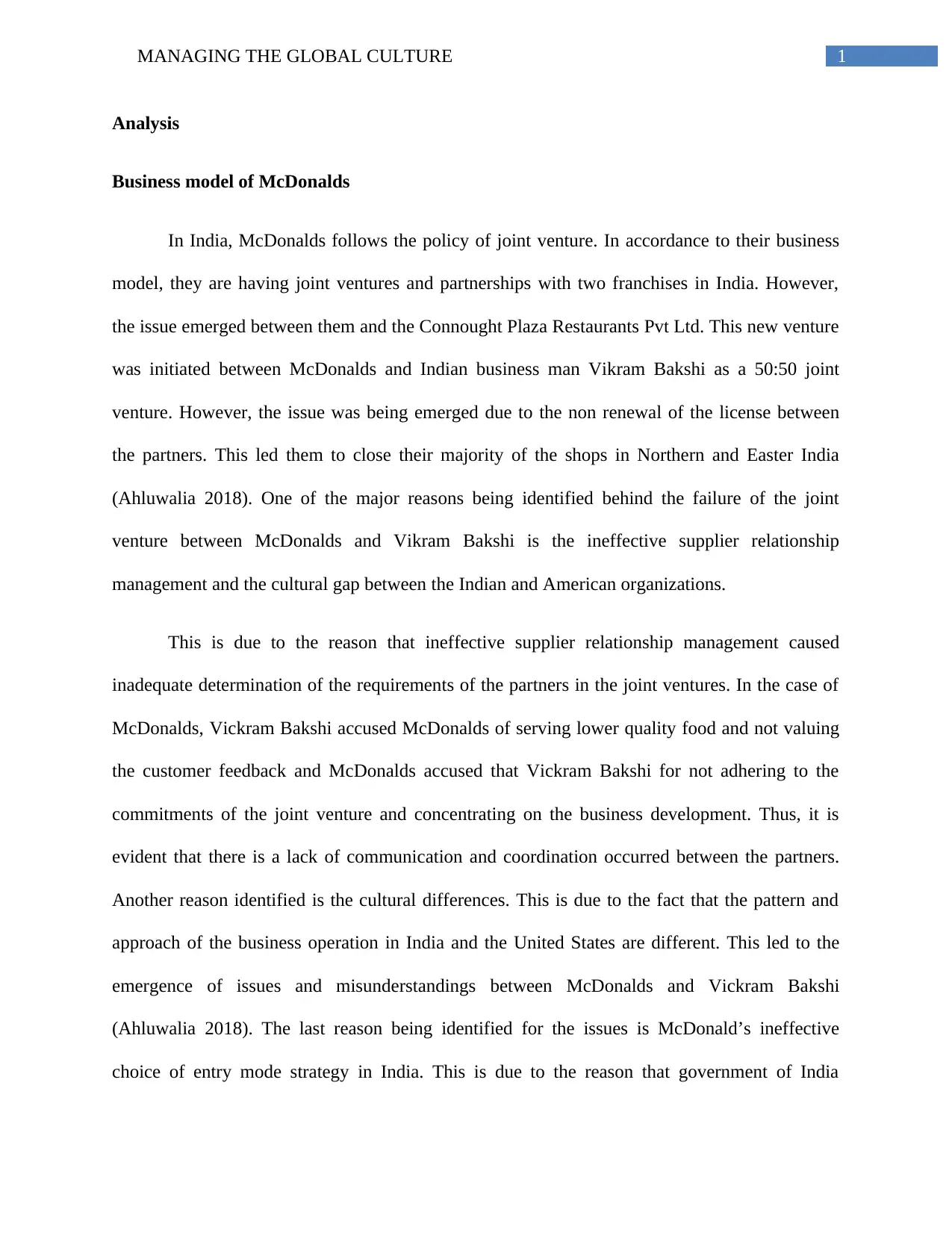
1MANAGING THE GLOBAL CULTURE
Analysis
Business model of McDonalds
In India, McDonalds follows the policy of joint venture. In accordance to their business
model, they are having joint ventures and partnerships with two franchises in India. However,
the issue emerged between them and the Connought Plaza Restaurants Pvt Ltd. This new venture
was initiated between McDonalds and Indian business man Vikram Bakshi as a 50:50 joint
venture. However, the issue was being emerged due to the non renewal of the license between
the partners. This led them to close their majority of the shops in Northern and Easter India
(Ahluwalia 2018). One of the major reasons being identified behind the failure of the joint
venture between McDonalds and Vikram Bakshi is the ineffective supplier relationship
management and the cultural gap between the Indian and American organizations.
This is due to the reason that ineffective supplier relationship management caused
inadequate determination of the requirements of the partners in the joint ventures. In the case of
McDonalds, Vickram Bakshi accused McDonalds of serving lower quality food and not valuing
the customer feedback and McDonalds accused that Vickram Bakshi for not adhering to the
commitments of the joint venture and concentrating on the business development. Thus, it is
evident that there is a lack of communication and coordination occurred between the partners.
Another reason identified is the cultural differences. This is due to the fact that the pattern and
approach of the business operation in India and the United States are different. This led to the
emergence of issues and misunderstandings between McDonalds and Vickram Bakshi
(Ahluwalia 2018). The last reason being identified for the issues is McDonald’s ineffective
choice of entry mode strategy in India. This is due to the reason that government of India
Analysis
Business model of McDonalds
In India, McDonalds follows the policy of joint venture. In accordance to their business
model, they are having joint ventures and partnerships with two franchises in India. However,
the issue emerged between them and the Connought Plaza Restaurants Pvt Ltd. This new venture
was initiated between McDonalds and Indian business man Vikram Bakshi as a 50:50 joint
venture. However, the issue was being emerged due to the non renewal of the license between
the partners. This led them to close their majority of the shops in Northern and Easter India
(Ahluwalia 2018). One of the major reasons being identified behind the failure of the joint
venture between McDonalds and Vikram Bakshi is the ineffective supplier relationship
management and the cultural gap between the Indian and American organizations.
This is due to the reason that ineffective supplier relationship management caused
inadequate determination of the requirements of the partners in the joint ventures. In the case of
McDonalds, Vickram Bakshi accused McDonalds of serving lower quality food and not valuing
the customer feedback and McDonalds accused that Vickram Bakshi for not adhering to the
commitments of the joint venture and concentrating on the business development. Thus, it is
evident that there is a lack of communication and coordination occurred between the partners.
Another reason identified is the cultural differences. This is due to the fact that the pattern and
approach of the business operation in India and the United States are different. This led to the
emergence of issues and misunderstandings between McDonalds and Vickram Bakshi
(Ahluwalia 2018). The last reason being identified for the issues is McDonald’s ineffective
choice of entry mode strategy in India. This is due to the reason that government of India
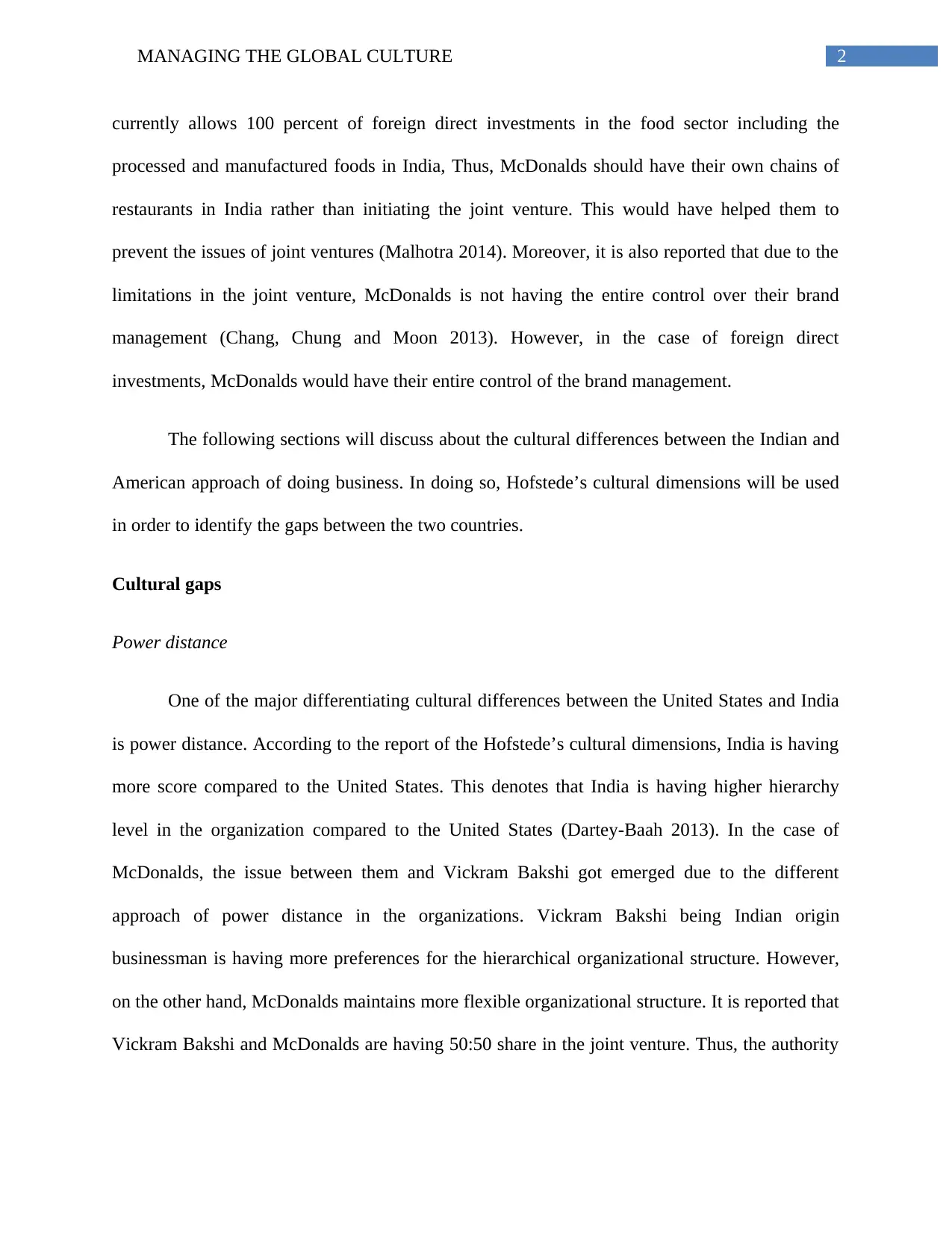
2MANAGING THE GLOBAL CULTURE
currently allows 100 percent of foreign direct investments in the food sector including the
processed and manufactured foods in India, Thus, McDonalds should have their own chains of
restaurants in India rather than initiating the joint venture. This would have helped them to
prevent the issues of joint ventures (Malhotra 2014). Moreover, it is also reported that due to the
limitations in the joint venture, McDonalds is not having the entire control over their brand
management (Chang, Chung and Moon 2013). However, in the case of foreign direct
investments, McDonalds would have their entire control of the brand management.
The following sections will discuss about the cultural differences between the Indian and
American approach of doing business. In doing so, Hofstede’s cultural dimensions will be used
in order to identify the gaps between the two countries.
Cultural gaps
Power distance
One of the major differentiating cultural differences between the United States and India
is power distance. According to the report of the Hofstede’s cultural dimensions, India is having
more score compared to the United States. This denotes that India is having higher hierarchy
level in the organization compared to the United States (Dartey-Baah 2013). In the case of
McDonalds, the issue between them and Vickram Bakshi got emerged due to the different
approach of power distance in the organizations. Vickram Bakshi being Indian origin
businessman is having more preferences for the hierarchical organizational structure. However,
on the other hand, McDonalds maintains more flexible organizational structure. It is reported that
Vickram Bakshi and McDonalds are having 50:50 share in the joint venture. Thus, the authority
currently allows 100 percent of foreign direct investments in the food sector including the
processed and manufactured foods in India, Thus, McDonalds should have their own chains of
restaurants in India rather than initiating the joint venture. This would have helped them to
prevent the issues of joint ventures (Malhotra 2014). Moreover, it is also reported that due to the
limitations in the joint venture, McDonalds is not having the entire control over their brand
management (Chang, Chung and Moon 2013). However, in the case of foreign direct
investments, McDonalds would have their entire control of the brand management.
The following sections will discuss about the cultural differences between the Indian and
American approach of doing business. In doing so, Hofstede’s cultural dimensions will be used
in order to identify the gaps between the two countries.
Cultural gaps
Power distance
One of the major differentiating cultural differences between the United States and India
is power distance. According to the report of the Hofstede’s cultural dimensions, India is having
more score compared to the United States. This denotes that India is having higher hierarchy
level in the organization compared to the United States (Dartey-Baah 2013). In the case of
McDonalds, the issue between them and Vickram Bakshi got emerged due to the different
approach of power distance in the organizations. Vickram Bakshi being Indian origin
businessman is having more preferences for the hierarchical organizational structure. However,
on the other hand, McDonalds maintains more flexible organizational structure. It is reported that
Vickram Bakshi and McDonalds are having 50:50 share in the joint venture. Thus, the authority
⊘ This is a preview!⊘
Do you want full access?
Subscribe today to unlock all pages.

Trusted by 1+ million students worldwide
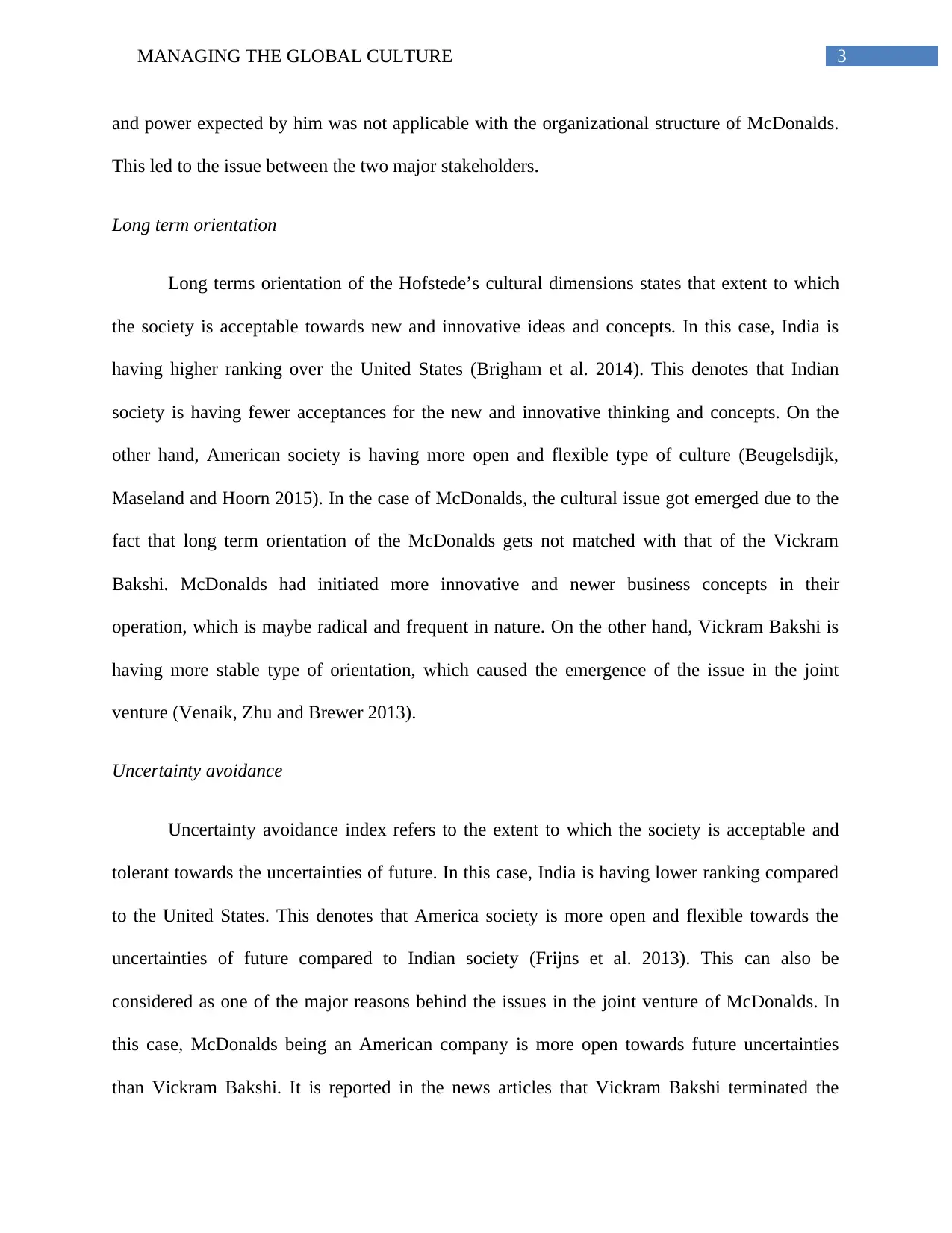
3MANAGING THE GLOBAL CULTURE
and power expected by him was not applicable with the organizational structure of McDonalds.
This led to the issue between the two major stakeholders.
Long term orientation
Long terms orientation of the Hofstede’s cultural dimensions states that extent to which
the society is acceptable towards new and innovative ideas and concepts. In this case, India is
having higher ranking over the United States (Brigham et al. 2014). This denotes that Indian
society is having fewer acceptances for the new and innovative thinking and concepts. On the
other hand, American society is having more open and flexible type of culture (Beugelsdijk,
Maseland and Hoorn 2015). In the case of McDonalds, the cultural issue got emerged due to the
fact that long term orientation of the McDonalds gets not matched with that of the Vickram
Bakshi. McDonalds had initiated more innovative and newer business concepts in their
operation, which is maybe radical and frequent in nature. On the other hand, Vickram Bakshi is
having more stable type of orientation, which caused the emergence of the issue in the joint
venture (Venaik, Zhu and Brewer 2013).
Uncertainty avoidance
Uncertainty avoidance index refers to the extent to which the society is acceptable and
tolerant towards the uncertainties of future. In this case, India is having lower ranking compared
to the United States. This denotes that America society is more open and flexible towards the
uncertainties of future compared to Indian society (Frijns et al. 2013). This can also be
considered as one of the major reasons behind the issues in the joint venture of McDonalds. In
this case, McDonalds being an American company is more open towards future uncertainties
than Vickram Bakshi. It is reported in the news articles that Vickram Bakshi terminated the
and power expected by him was not applicable with the organizational structure of McDonalds.
This led to the issue between the two major stakeholders.
Long term orientation
Long terms orientation of the Hofstede’s cultural dimensions states that extent to which
the society is acceptable towards new and innovative ideas and concepts. In this case, India is
having higher ranking over the United States (Brigham et al. 2014). This denotes that Indian
society is having fewer acceptances for the new and innovative thinking and concepts. On the
other hand, American society is having more open and flexible type of culture (Beugelsdijk,
Maseland and Hoorn 2015). In the case of McDonalds, the cultural issue got emerged due to the
fact that long term orientation of the McDonalds gets not matched with that of the Vickram
Bakshi. McDonalds had initiated more innovative and newer business concepts in their
operation, which is maybe radical and frequent in nature. On the other hand, Vickram Bakshi is
having more stable type of orientation, which caused the emergence of the issue in the joint
venture (Venaik, Zhu and Brewer 2013).
Uncertainty avoidance
Uncertainty avoidance index refers to the extent to which the society is acceptable and
tolerant towards the uncertainties of future. In this case, India is having lower ranking compared
to the United States. This denotes that America society is more open and flexible towards the
uncertainties of future compared to Indian society (Frijns et al. 2013). This can also be
considered as one of the major reasons behind the issues in the joint venture of McDonalds. In
this case, McDonalds being an American company is more open towards future uncertainties
than Vickram Bakshi. It is reported in the news articles that Vickram Bakshi terminated the
Paraphrase This Document
Need a fresh take? Get an instant paraphrase of this document with our AI Paraphraser
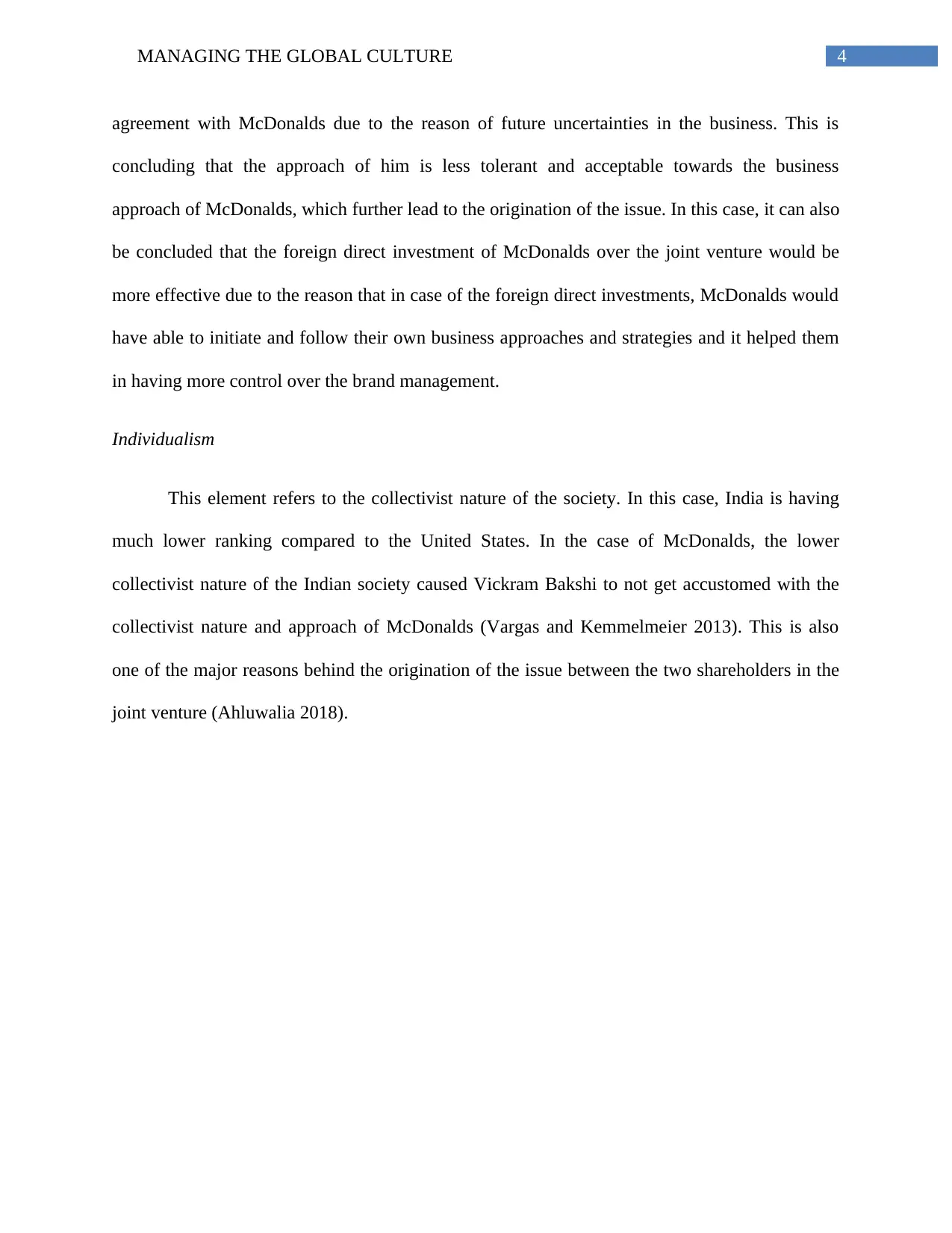
4MANAGING THE GLOBAL CULTURE
agreement with McDonalds due to the reason of future uncertainties in the business. This is
concluding that the approach of him is less tolerant and acceptable towards the business
approach of McDonalds, which further lead to the origination of the issue. In this case, it can also
be concluded that the foreign direct investment of McDonalds over the joint venture would be
more effective due to the reason that in case of the foreign direct investments, McDonalds would
have able to initiate and follow their own business approaches and strategies and it helped them
in having more control over the brand management.
Individualism
This element refers to the collectivist nature of the society. In this case, India is having
much lower ranking compared to the United States. In the case of McDonalds, the lower
collectivist nature of the Indian society caused Vickram Bakshi to not get accustomed with the
collectivist nature and approach of McDonalds (Vargas and Kemmelmeier 2013). This is also
one of the major reasons behind the origination of the issue between the two shareholders in the
joint venture (Ahluwalia 2018).
agreement with McDonalds due to the reason of future uncertainties in the business. This is
concluding that the approach of him is less tolerant and acceptable towards the business
approach of McDonalds, which further lead to the origination of the issue. In this case, it can also
be concluded that the foreign direct investment of McDonalds over the joint venture would be
more effective due to the reason that in case of the foreign direct investments, McDonalds would
have able to initiate and follow their own business approaches and strategies and it helped them
in having more control over the brand management.
Individualism
This element refers to the collectivist nature of the society. In this case, India is having
much lower ranking compared to the United States. In the case of McDonalds, the lower
collectivist nature of the Indian society caused Vickram Bakshi to not get accustomed with the
collectivist nature and approach of McDonalds (Vargas and Kemmelmeier 2013). This is also
one of the major reasons behind the origination of the issue between the two shareholders in the
joint venture (Ahluwalia 2018).
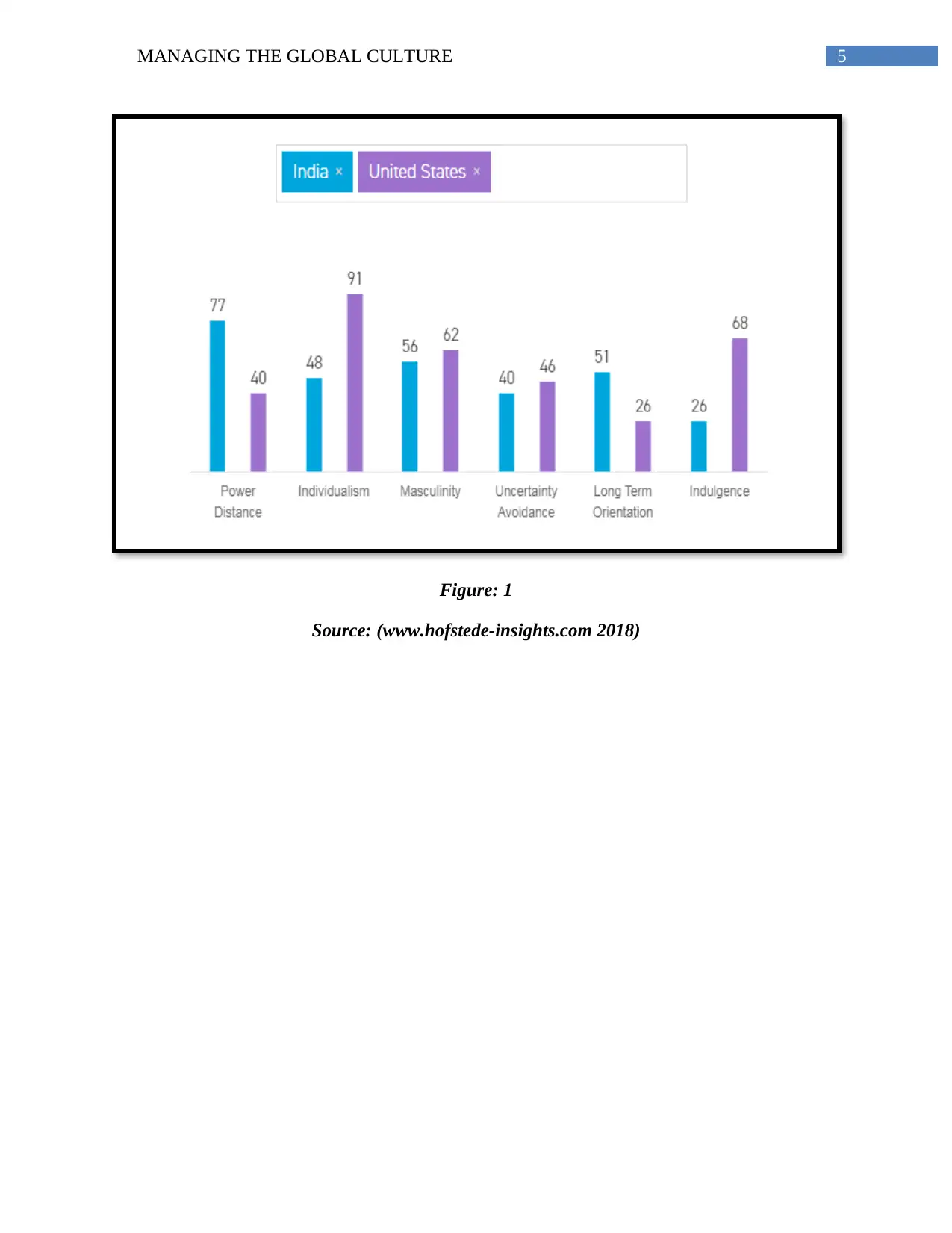
5MANAGING THE GLOBAL CULTURE
Figure: 1
Source: (www.hofstede-insights.com 2018)
Figure: 1
Source: (www.hofstede-insights.com 2018)
⊘ This is a preview!⊘
Do you want full access?
Subscribe today to unlock all pages.

Trusted by 1+ million students worldwide
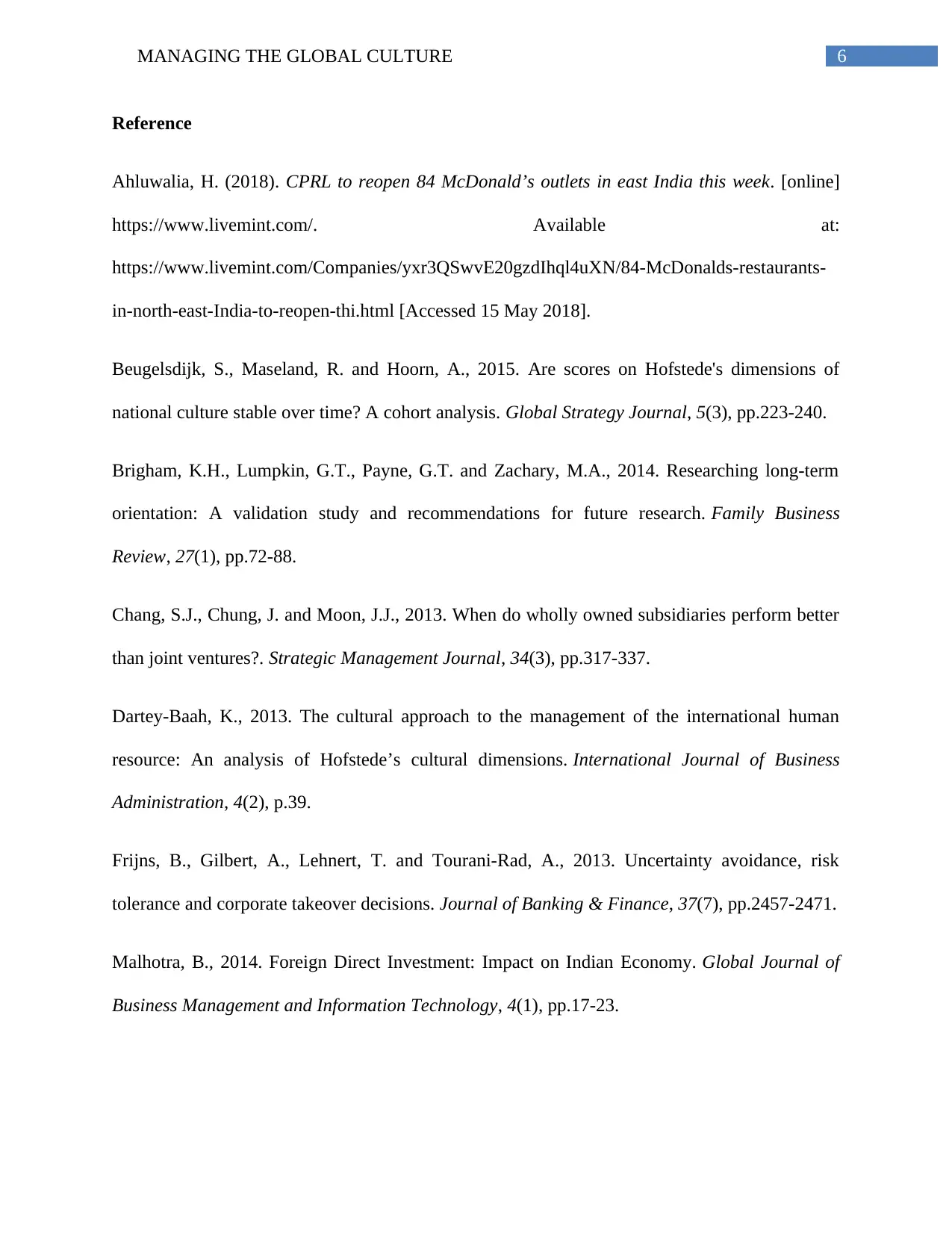
6MANAGING THE GLOBAL CULTURE
Reference
Ahluwalia, H. (2018). CPRL to reopen 84 McDonald’s outlets in east India this week. [online]
https://www.livemint.com/. Available at:
https://www.livemint.com/Companies/yxr3QSwvE20gzdIhql4uXN/84-McDonalds-restaurants-
in-north-east-India-to-reopen-thi.html [Accessed 15 May 2018].
Beugelsdijk, S., Maseland, R. and Hoorn, A., 2015. Are scores on Hofstede's dimensions of
national culture stable over time? A cohort analysis. Global Strategy Journal, 5(3), pp.223-240.
Brigham, K.H., Lumpkin, G.T., Payne, G.T. and Zachary, M.A., 2014. Researching long-term
orientation: A validation study and recommendations for future research. Family Business
Review, 27(1), pp.72-88.
Chang, S.J., Chung, J. and Moon, J.J., 2013. When do wholly owned subsidiaries perform better
than joint ventures?. Strategic Management Journal, 34(3), pp.317-337.
Dartey-Baah, K., 2013. The cultural approach to the management of the international human
resource: An analysis of Hofstede’s cultural dimensions. International Journal of Business
Administration, 4(2), p.39.
Frijns, B., Gilbert, A., Lehnert, T. and Tourani-Rad, A., 2013. Uncertainty avoidance, risk
tolerance and corporate takeover decisions. Journal of Banking & Finance, 37(7), pp.2457-2471.
Malhotra, B., 2014. Foreign Direct Investment: Impact on Indian Economy. Global Journal of
Business Management and Information Technology, 4(1), pp.17-23.
Reference
Ahluwalia, H. (2018). CPRL to reopen 84 McDonald’s outlets in east India this week. [online]
https://www.livemint.com/. Available at:
https://www.livemint.com/Companies/yxr3QSwvE20gzdIhql4uXN/84-McDonalds-restaurants-
in-north-east-India-to-reopen-thi.html [Accessed 15 May 2018].
Beugelsdijk, S., Maseland, R. and Hoorn, A., 2015. Are scores on Hofstede's dimensions of
national culture stable over time? A cohort analysis. Global Strategy Journal, 5(3), pp.223-240.
Brigham, K.H., Lumpkin, G.T., Payne, G.T. and Zachary, M.A., 2014. Researching long-term
orientation: A validation study and recommendations for future research. Family Business
Review, 27(1), pp.72-88.
Chang, S.J., Chung, J. and Moon, J.J., 2013. When do wholly owned subsidiaries perform better
than joint ventures?. Strategic Management Journal, 34(3), pp.317-337.
Dartey-Baah, K., 2013. The cultural approach to the management of the international human
resource: An analysis of Hofstede’s cultural dimensions. International Journal of Business
Administration, 4(2), p.39.
Frijns, B., Gilbert, A., Lehnert, T. and Tourani-Rad, A., 2013. Uncertainty avoidance, risk
tolerance and corporate takeover decisions. Journal of Banking & Finance, 37(7), pp.2457-2471.
Malhotra, B., 2014. Foreign Direct Investment: Impact on Indian Economy. Global Journal of
Business Management and Information Technology, 4(1), pp.17-23.
Paraphrase This Document
Need a fresh take? Get an instant paraphrase of this document with our AI Paraphraser
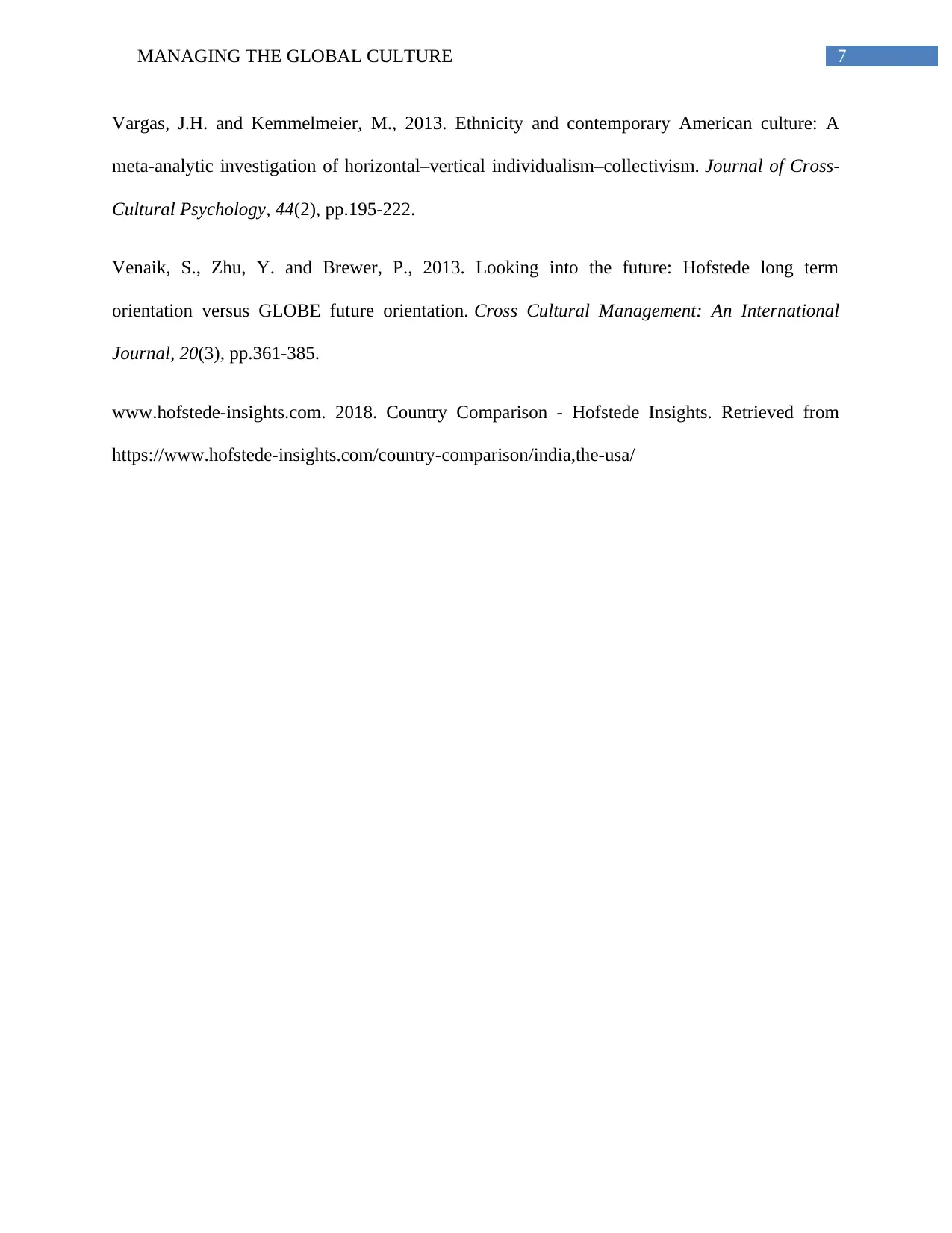
7MANAGING THE GLOBAL CULTURE
Vargas, J.H. and Kemmelmeier, M., 2013. Ethnicity and contemporary American culture: A
meta-analytic investigation of horizontal–vertical individualism–collectivism. Journal of Cross-
Cultural Psychology, 44(2), pp.195-222.
Venaik, S., Zhu, Y. and Brewer, P., 2013. Looking into the future: Hofstede long term
orientation versus GLOBE future orientation. Cross Cultural Management: An International
Journal, 20(3), pp.361-385.
www.hofstede-insights.com. 2018. Country Comparison - Hofstede Insights. Retrieved from
https://www.hofstede-insights.com/country-comparison/india,the-usa/
Vargas, J.H. and Kemmelmeier, M., 2013. Ethnicity and contemporary American culture: A
meta-analytic investigation of horizontal–vertical individualism–collectivism. Journal of Cross-
Cultural Psychology, 44(2), pp.195-222.
Venaik, S., Zhu, Y. and Brewer, P., 2013. Looking into the future: Hofstede long term
orientation versus GLOBE future orientation. Cross Cultural Management: An International
Journal, 20(3), pp.361-385.
www.hofstede-insights.com. 2018. Country Comparison - Hofstede Insights. Retrieved from
https://www.hofstede-insights.com/country-comparison/india,the-usa/
1 out of 8
Related Documents
Your All-in-One AI-Powered Toolkit for Academic Success.
+13062052269
info@desklib.com
Available 24*7 on WhatsApp / Email
![[object Object]](/_next/static/media/star-bottom.7253800d.svg)
Unlock your academic potential
Copyright © 2020–2026 A2Z Services. All Rights Reserved. Developed and managed by ZUCOL.





